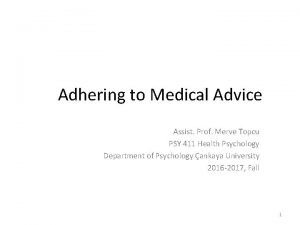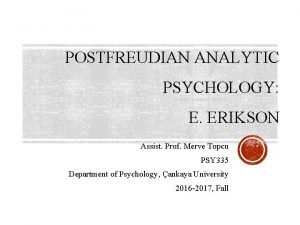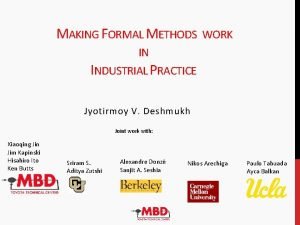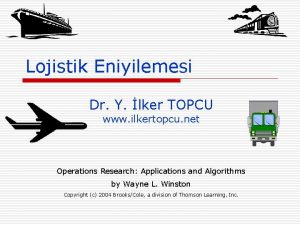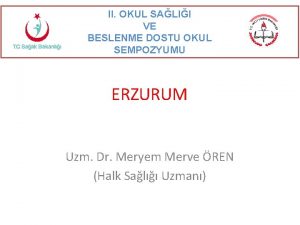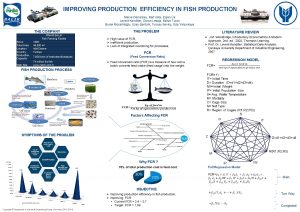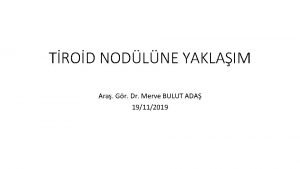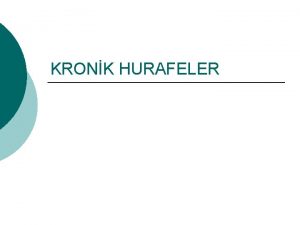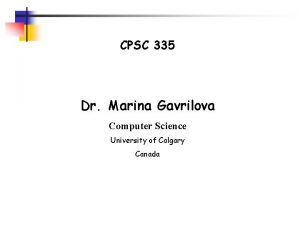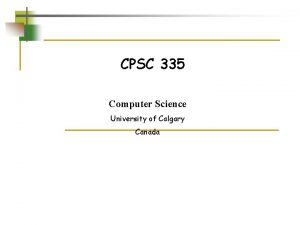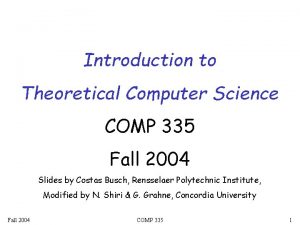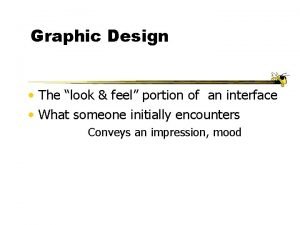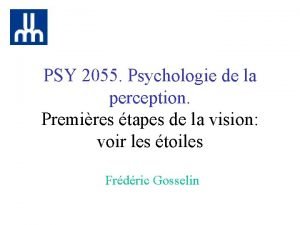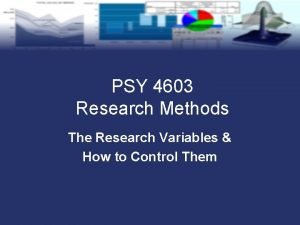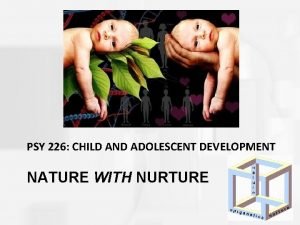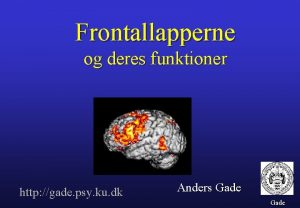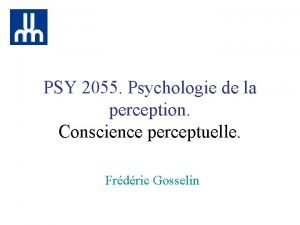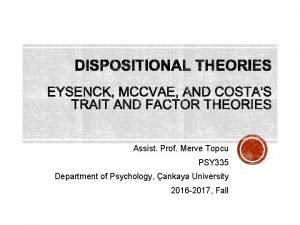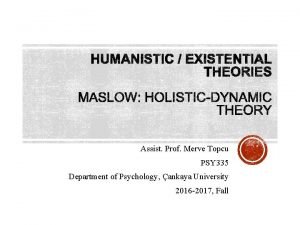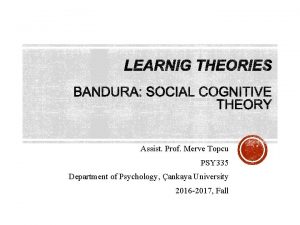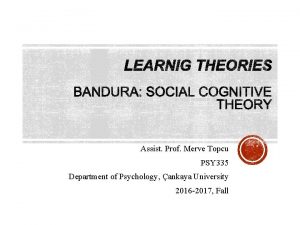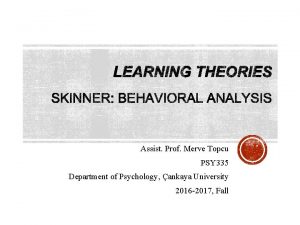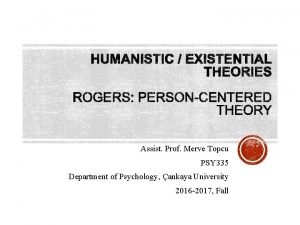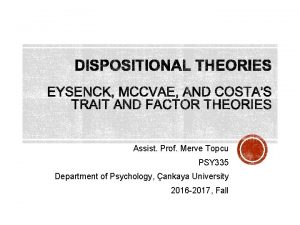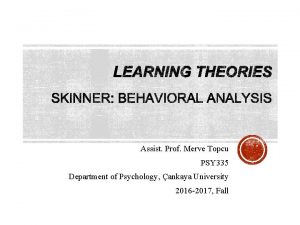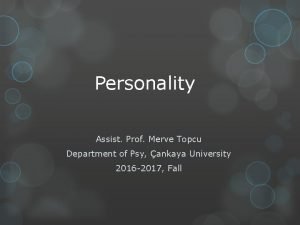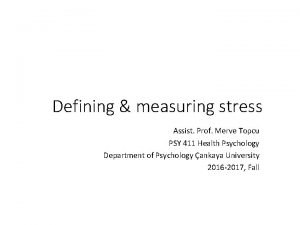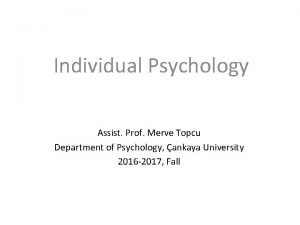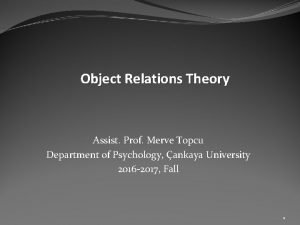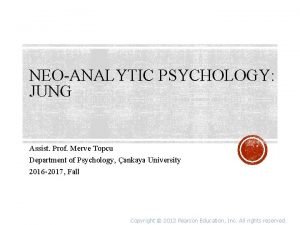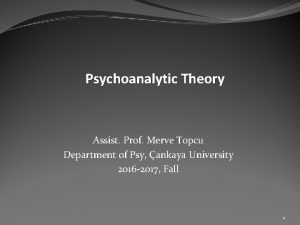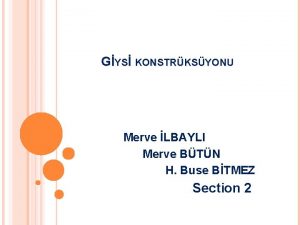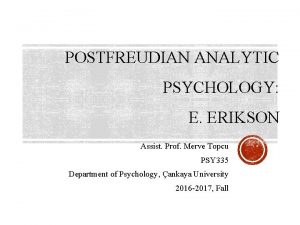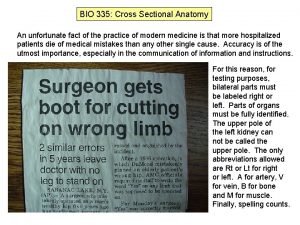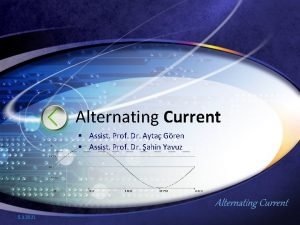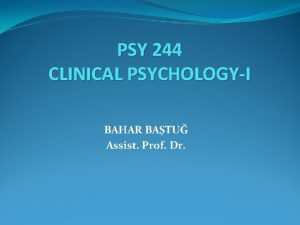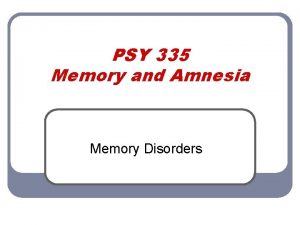Assist Prof Merve Topcu PSY 335 Department of







































- Slides: 39

Assist. Prof. Merve Topcu PSY 335 Department of Psychology, Çankaya University 2016 -2017, Fall

§ Interested in farming § ‘necessary and sufficient" conditions for the optimal growth of plants and animals’ § His research on the "necessary and sufficient" conditions for human psychological growth § Unlike Freud, who was primarily a theorist and secondarily a therapist, Rogers was a consummate therapist but only a reluctant theorist § "How can I help this person grow and develop?

§ Early called his approach was known as ‘nondirective’ § His approach was variously termed "client-centered, " "person- centered, " "student-centered’, ‘group-centered’ and ‘person to person’ § Person-Centered Theory § If-then framework § Congruence, unconditional positive regard and empathy

§ Two broad assumptions 1. Formative Tendency 2. Actualizing Tendency

§ There is a tendency for all matter, both organic and inorganic, to evolve from simpler to more complex forms § the formative tendency, the entire universe’s creative process § Human consciousness evolves from a primitive unconsciousness to a highly organized awareness

§ the actualizing tendency, the tendency within all humans (and other animals and plants) to move toward completion or fulfillment of potentials § the need to satisfy one's hunger drive, to express deep emotions when they are felt, and to accept one's self are all examples of the single motive of actualization § the whole person § Physiological and intellectual, rational and emotional, conscious and unconscious

§ The need for maintenance is similar to the lower steps on Maslow's hierarchy of needs § The conservative nature of maintenance needs is expressed in people's desire to protect their current, comfortable self-concept § People fight against new ideas; they distort experiences that do not quite fit; they find change painful and growth frightening § Need to become more, to develop, and to achieve growth is called enhancement § Crawling can satisfy the need for mobility, whereas walking is associated with falling and with pain § Enhancement needs are expressed in a variety of forms § Curiosity, playfulness, self-exploration, friendship, and confidence that one can achieve psychological growth

§ The actualization tendency is not limited to humans § Genetic potential § A human's actualization tendency is realized only under certain conditions § people must be involved in a relationship with a partner who is congruent, or authentic, and who demonstrates empathy and unconditional positive regard § Rogers contended that whenever congruence, unconditional positive regard, and empathy are present in a relationship, psychological growth will invariably occur § both necessary and sufficient conditions for becoming a fully functioning or self -actualizing person

§ infants begin to develop a vague concept of self § Infants gradually become aware of their own identity by experience § Once infants establish a rudimentary self structure, their tendency to actualize the self begins to evolve § Self-actualization & Actualization tendency § Self-actualization is a subset of the actualization tendency § Actualization tendency refers to organismic experiences of the individual § It refers to the whole person-conscious and unconscious, physiological and cognitive § Self-actualization is the tendency to actualize the self as perceived in awareness § When the organism and the perceived self are in harmony, the two actualization tendencies are nearly identical; but when people's organismic experiences are not in harmony with their view of self, a discrepancy exists between the actualization tendency and the self-actualization tendency

§ Two self subsystems § the self-concept § the ideal self

§ All those aspects of one's being and one's experiences that are perceived in awareness § May not always be accurate § The self-concept is not identical with the organismic self § Unless it malfunctions and causes concern, it is not likely to be part of one's self -concept § Experiences that are inconsistent with their self-concept usually are either denied or accepted only in distorted forms § Change most readily occurs in an atmosphere of acceptance by others § allows a person to reduce anxiety and threat and to take ownership of previously rejected experiences

§ One's view of self as one wishes to be § A wide gap between the ideal self and the self-concept indicates incongruence and an unhealthy personality § Little discrepancy between their self-concept & ideal self in psychologically healthy people

§ Without awareness the self-concept and the ideal self would not exist § Awareness as "the symbolic representation of some portion of ow experience « § Used the term synonymously with both consciousness and symbolization Levels of Awareness • Three levels of awareness • events are experienced below the threshold of awareness and are either ignored or denied • experiences are accurately symbolized and freely admitted to the selfstructure • experiences that are perceived in a distorted form

§ An individual must make contact-positive or negative-with another person § from a parent or other caregiver § Regarding § value positive regard and devalue negative regard § Positive regard is a prerequisite for positive self-regard § the experience of prizing or valuing one's self § once positive self-regard is established, it becomes independent of the continual need to be loved § the person then "becomes in a sense his [or her] own significant social other"

§ Not everyone becomes a psychologically healthy person. Rather, most people experience conditions of worth, incongruence, defensiveness, and disorganization § Worth § Conditonal § they perceive that their parents, peers, or partners love and accept them only if they meet those people's expectations and approval § believe others’ appraisals of others that are consistent with own negative view of self, ignore our own sensory and visceral perceptions, and gradually become estranged from ow real or organismic self § look for direction and guidance § Our perceptions of other people's view of us are called external evaluations § As a result, we experience incongruence

§ Incongruence § the organism and the self are two separate entities that may or may not be congruent with one another § actualization refers to the organism's tendency to move toward fulfillment § self-actualization is the desire of the perceived self to reach fulfillment § Psychological disequilibrium begins when we fail to recognize ow organismic experiences as self-experiences § Incongruence between our self-concept and our organismic experience is the source of psychological disorders § Sometimes we behave in ways that maintain or enhance our actualizing tendency, and at other times, we may behave in a manner designed to maintain or enhance a self-concept founded on other people's expectations and evaluations of us

§ People are vulnerable when they are unaware of the discrepancy between their organismic self and their significant experience § Vulnerability exists when we have no awareness of the incongruence within our self § Anxiety & threat are experienced as we gain awareness of such an incongruence § anxiety as "a state of uneasiness or tension whose cause is unknown’ § As we become more aware of the incongruence between our organismic experience and ow perception of self, our anxiety begins to evolve into threat

§ Defensiveness § In order to prevent this inconsistency between ow organismic experience and our perceived self, we react in a defensive manner § the protection of the self-concept against anxiety and threat by the denial or distortion of experiences inconsistent with it § The two chief defenses are distortion & denial § With distortion, we misinterpret an experience in order to fit it into some aspect of our self-concept § fail to understand its true meaning of the experience § Denial, refuse to perceive an experience in awareness, or at least we keep some aspect of it from reaching symbolization § Ignore or block out experiences that otherwise would cause unpleasant anxiety or threat

§ Disorganization § Sometimes defenses fail and behavior becomes disorganized or psychotic § Normal defensive behavior, a discrepancy between people's organismic experience and their view of self § When the incongruence between people's perceived self and their organismic experience is either too obvious or occurs too suddenly to be denied or distorted, their behavior becomes disorganized § Psychological maladjustment is due to discrepancy

§ Client-centered therapy is deceptively simple in statement but decidedly difficult in practice § in order for vulnerable or anxious people to grow psychologically, they must come into contact with a therapist who is congruent and whom they perceive as providing an atmosphere of unconditional acceptance and accurate empathy § If the conditions of therapist congruence, unconditional positive regard and empathic listening are present in a client-counselor relationship, then the process of therapy will transpire

§ Conditions § the conditions of counselor congruence, unconditional positive regard, and empathic listening are both necessary and sufficient § congruence is more basic than either unconditional positive regard or empathic listening

§ Counselor Congruence § Congruence exists when a person's organismic experiences are matched by an awareness of them and by an ability and willingness to openly express these feelings (Rogers, 1980). § A congruent therapist, therefore, is not passive, not aloof, and definitely not "nondirective. « § they are constantly exposed to new organismic experiences, but unlike most people, they accept these experiences into awareness, which contributes to their psychological growth § wear no mask, do not attempt to fake a pleasant facade, and avoid any pretense of friendliness and affection when these emotions are not truly felt § match feelings with awareness and both with honest expression

§ Counselor Congruence (cont’d) § Congruence involves 1. Feelings 2. Awareness 3. Expression § Incongruence can arise from either of the two points dividing these three experiences § there can be a breakdown between feelings and awareness § a discrepancy between awareness of an experience and the ability or willingness to express it to another § Rogers (1980) did not believe that it is necessary for a therapist to be congruent in all relationships outside therapeutic process

§ Unconditional Positive Regard § Positive regard is the need to be liked, prized, or accepted by another person § The attitude is without possessiveness, without evaluations, and without reservations. § nonpossessive warmth means to care about another without smothering or owning that person "Because I care about you, I can permit you to be autonomous and independent of my evaluations and restrictions. You are a separate person with your own feelings and opinions regarding what is right or wrong. The fact that I care for you does not mean that I must guide you in making choices, but that I can allow you to be yourself and to decide what is best for you. "

§ Unconditional Positive Regard (cont’d) § External evaluation, whether positive or negative, leads to clients' defensiveness and prevents psychological growth § "Regard" means that there is a close relationship and that the § therapist sees the client as an important person; § "positive" indicates that the direction of the relationship is toward warm and caring feelings; § "unconditional" suggests that the positive regard is no longer dependent on specific client behaviors and does not have to be continually earned

§ Empathic Listening § Empathy exists when therapists accurately sense the feelings of their clients and are able to communicate these perceptions so that clients know that another person has entered their world of feelings without prejudice, projection, or evaluation. § Empathy does not involve interpreting clients' meanings or uncovering their unconscious feelings § Client-centered therapists do not take empathy for granted; they check the accuracy of their sensings by trying them out on the client § Empathy should not be confused with sympathy. § Self-pity § The feelings belong to the client, not therapist.

§ Process § If the conditions of therapist congruence, unconditional positive regard, and empathy are present, then the process of therapeutic change will be set in motion § Stages of Therapeutic Change § The process of constructive personality change can be placed on a continuum from most defensive to most integrated. § 7 stages

§ Stage I § characterized by an unwillingness to communicate anything about oneself. § People at this stage ordinarily do not seek help, § but if for some reason they come to therapy, they are extremely rigid and resistant to change. § They do not recognize any problems and refuse to own any personal feelings or emotions.

§ Stage II § Clients become slightly less rigid. § They discuss external events and other people, but they still disown or fail to recognize their own feelings. § However, they may talk about personal feelings as if such feelings were objective phenomena.

§ Stage III § They more freely talk about self, although still as an object. § "I'm doing the best I can at work, but my boss still doesn't like me. « § Clients talk about feelings and emotions in the past or future tense and avoid present feelings. § They refuse to accept their emotions, keep personal feelings at a distance from the here-and-now situation, § Only vaguely perceive that they can make personal choices, and deny individual responsibility for most of their decisions.

§ Stage IV § Begin to talk of deep feelings but not ones presently felt. § "I was really burned up when my teacher accused me of cheating. " § When clients do express present feelings, they are usually surprised by this expression. § They deny or distort experiences, although they may have some dim recognition that they are capable of feeling emotions in the present. § They begin to question some values that have been introjected from others, and they start to see the incongruence between their perceived self and their organismic experience. § They accept more freedom and responsibility than they did in Stage III § begin to tentatively allow themselves to become involved in a relationship with therapist.

§ Stage V § they have begun to undergo significant change and growth. § They can express feelings in the present, although they have not yet accurately symbolized those feelings. § They are beginning to rely on an internal locus of evaluation for their feelings and to make fresh and new discoveries about themselves. § They also experience a greater differentiation of feelings and develop more appreciation for nuances among them. § In addition, they begin to make their own decisions and to accept responsibility for their choices.

§ Stage VI § Experience dramatic growth and an irreversible movement toward becoming fully functioning or self-actualizing. § They freely allow into awareness those experiences that they had previously denied or distorted. § They become more congruent and are able to match their present experiences with awareness and with open expression. § They no longer evaluate their own behavior from an external viewpoint but rely on their organismic self as the criterion for evaluating experiences. § They begin to develop unconditional self-regard, which means that they have a feeling of genuine caring and affection for the person they are becoming. § Physiological loosening § People experience their whole organismic self, as their muscles relax, tears flow, circulation improves, and physical symptoms disappear.

§ Stage VII can occur outside therapeutic encounter, § because growth at Stage VI seems to be irreversible. § Clients who reach Stage 7 become fully functioning persons of tomorrow § able to generalize their in-therapy experiences to their world beyond therapy. § possess the confidence to be themselves at all times, to own and to feel deeply the totality of their experiences, and to live those experiences in the present. § Their organismic self, now unified with the self-concept, becomes the locus for evaluating their experiences. § receive pleasure in knowing that these evaluations are fluid and that change and growth will continue. § They become congruent, possess unconditional positive self-regard, and are able to be loving and empathic toward others.

§ What theoretical formulation can explain the dynamics of therapeutic change? § When persons come to experience themselves as prized and unconditionally accepted, they realize, perhaps for the first time, that they are lovable. § As clients perceive that they are emphatically understood, they are freed to listen to themselves more accurately, to have empathy for their own feelings § Their perceived self becomes more congruent with their organismic experiences. § they become their own therapist

§ Outcomes § If the process of therapeutic change is set in motion, then certain observable outcomes can be expected. § a congruent client who is less defensive and more open to experience § Each of the remaining outcomes is a logical extension of this basic one. § better able to assimilate experiences into the self on the symbolic level § more effective in solving problems § have a higher level of positive self-regard § Experience less physiological and psychological tension § less vulnerable to threat § have less anxiety § feel sufficiently safe to take ownership of an increasing number of their experiences and comfortable enough with themselves to lessen their need for denial and distortion.


§ If the three necessary and sufficient therapeutic conditions of congruence, unconditional positive regard and empathy are optimal, then what kind of person would emerge? § more adaptable § open to their experiences § trust in their organismic selves § live fully in the moment § harmonious relations with others § more integrated § basic trust of human nature § enjoy a greater richness in life

§ Science begins and ends with the subjective experience, although everything in between must be objective and empirical § Scientists must have many of the characteristics of the person of tomorrow § they must be inclined to look within § to be in tune with internal feelings and values § to be intuitive and creative § to be open to experiences § to welcome change § to have a fresh outlook § to possess a solid trust in themselves § Precise methods prevent the scientist from self-deception and from intentionally or unintentionally manipulating the observations. § The Chicago Studies § Aims to investigate both the process and the outcomes of client-centered therapy
 Merve topcu
Merve topcu What is adoloscence
What is adoloscence Ufuk topcu
Ufuk topcu Havva eylem polat
Havva eylem polat Ilker topçu
Ilker topçu Merve başkurt kimdir
Merve başkurt kimdir Merve denizci nazlıgül
Merve denizci nazlıgül Meryem merve ören
Meryem merve ören Haccın insan davranışları üzerindeki etkisi
Haccın insan davranışları üzerindeki etkisi ödev yapmayınca bahaneler
ödev yapmayınca bahaneler Mescidi hayf
Mescidi hayf Fish
Fish Merve diyar
Merve diyar Okul veya mezuniyet derecesi uygunsuz
Okul veya mezuniyet derecesi uygunsuz Merve gözütok
Merve gözütok Merve uzunöz
Merve uzunöz Merve bulut hot
Merve bulut hot Phonemana
Phonemana Merve utku
Merve utku 30 tac 335
30 tac 335 Cpsc 335
Cpsc 335 Cpsc 335
Cpsc 335 Cmsc 335
Cmsc 335 Sim 335
Sim 335 Cpsc 335
Cpsc 335 30 tac 335
30 tac 335 Builder design pattern uml diagram
Builder design pattern uml diagram Cmsc335
Cmsc335 30 tac 335
30 tac 335 Csc 335
Csc 335 Comp 335
Comp 335 Psy
Psy Psy
Psy Psy 2055
Psy 2055 Gramaticke kategorie
Gramaticke kategorie Psy
Psy Euro psy
Euro psy Psy 226
Psy 226 Nukleus caudatus
Nukleus caudatus Psy 2055
Psy 2055
